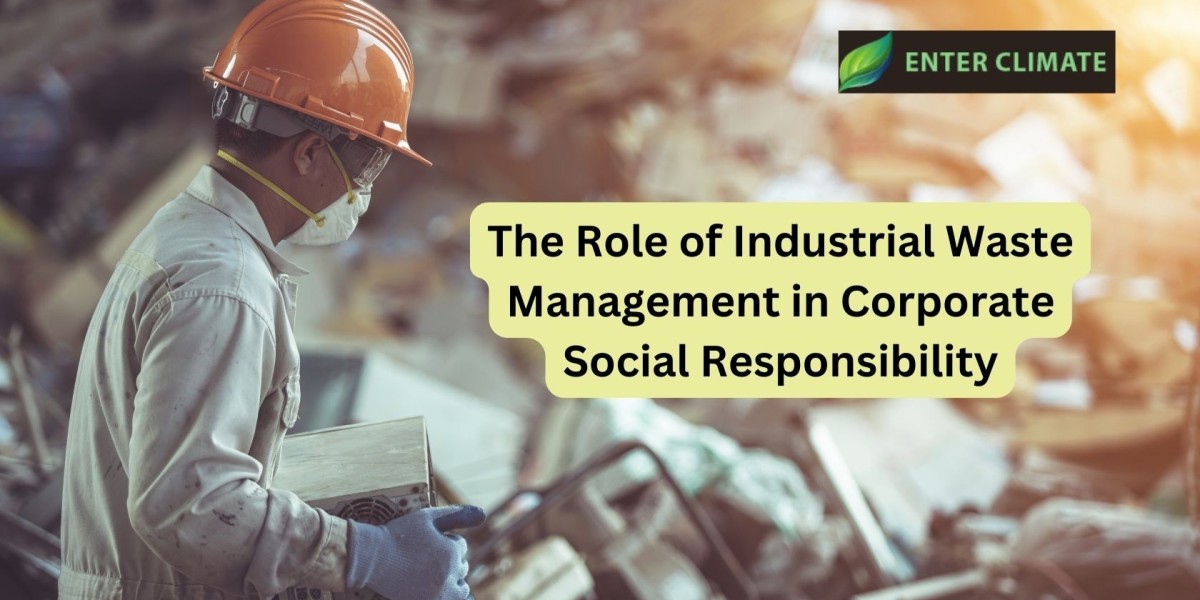In today’s business world, corporate social responsibility (CSR) is more than just a buzzword; it’s a critical component of long-term success. As companies become more aware of their environmental impact, the role of industrial waste management has become increasingly important in shaping CSR strategies. Effective waste management doesn’t just help companies comply with regulations; it enhances brand reputation, reduces costs, and promotes sustainability – all key factors for businesses looking to meet their CSR goals.
In this blog, we’ll explore the connection between industrial waste management and CSR, discussing how companies can integrate waste management practices into their CSR strategy and the positive impact it can have on both the environment and the bottom line.
What is Corporate Social Responsibility (CSR)?
Corporate Social Responsibility (CSR) refers to a company’s commitment to operating in a socially responsible manner, focusing on the ethical treatment of employees, customers, and the environment. CSR encompasses various initiatives, including reducing environmental footprints, supporting local communities, and adhering to ethical business practices.
For businesses, CSR isn’t just about philanthropy – it’s about aligning operations with sustainable practices and demonstrating a commitment to long-term positive impact. This is where industrial waste management plays a pivotal role.
Why Industrial Waste Management Matters for CSR
Industrial waste management involves the process of handling, treating, and disposing of waste materials generated during manufacturing processes. Waste can take many forms, including solid waste, hazardous materials, and wastewater. Efficient waste management not only ensures compliance with environmental regulations but also helps companies achieve their sustainability goals, conserve resources, and reduce environmental pollution.
1. Reducing Environmental Impact
One of the most significant aspects of CSR is a company’s environmental responsibility. Industrial waste – especially hazardous waste – can have severe consequences for the environment if not properly managed. By implementing an effective waste management system, companies can minimize harmful emissions, water pollution, and soil contamination.
For example, recycling and reusing materials helps reduce the need for raw material extraction and processing, which often causes environmental degradation. A comprehensive industrial waste management system also reduces the amount of waste sent to landfills, thereby lowering a company’s carbon footprint.
Taking responsibility for waste management demonstrates a company’s commitment to environmental stewardship, a critical aspect of CSR that resonates with consumers, investors, and regulatory bodies.
2. Building a Positive Brand Image
Today’s consumers are more environmentally conscious than ever before. They are increasingly making purchasing decisions based on the ethical values of the companies they support. A strong CSR strategy that includes responsible industrial waste management can help enhance your brand’s reputation and attract customers who prioritize sustainability.
By showcasing your commitment to reducing waste, recycling, and properly disposing of hazardous materials, you can differentiate your company from competitors. Companies with a transparent and effective waste management strategy build trust with their audience, leading to increased customer loyalty and brand value.
For example, companies in the food and beverage industry that commit to reducing packaging waste or using recyclable materials have seen a boost in their reputation among eco-conscious consumers.
3. Compliance with Environmental Regulations
Incorporating waste management into a company’s CSR strategy also ensures compliance with various environmental laws and regulations. Governments around the world are tightening regulations related to waste disposal, emissions, and environmental impact. Failure to comply with these regulations can result in significant fines, legal costs, and damage to a company’s reputation.
An effective waste management program helps companies stay ahead of these regulatory requirements by ensuring that all waste is disposed of properly and that recycling or waste reduction efforts are in place. By proactively managing waste and adhering to legal standards, businesses not only reduce their environmental impact but also avoid potential liabilities that could harm their financial position and reputation.
4. Cost Savings Through Waste Reduction
A well-structured waste management system can also result in substantial cost savings for businesses. Reducing waste through strategies like process optimization, recycling, and waste minimization can cut down on disposal costs and raw material expenses.
Reusing materials within the manufacturing process can reduce the need for new raw materials, leading to lower procurement costs. For example, scrap metal from production can be repurposed into new products, reducing the need to purchase additional resources.
Moreover, some businesses that implement waste-to-energy programs can even generate energy from waste, further lowering energy costs and supporting their sustainability efforts. These cost-saving measures directly contribute to a company’s profitability while reinforcing their CSR initiatives.
5. Encouraging Employee Engagement and Responsibility
Industrial waste management isn’t just the responsibility of management – it’s something that employees at all levels can contribute to. Employees who are actively engaged in the company’s waste reduction initiatives feel a sense of pride and ownership in the business’s CSR efforts.
By training employees on proper waste disposal practices, encouraging waste reduction in daily operations, and rewarding sustainable practices, companies foster a culture of responsibility. This not only enhances employee morale but also increases workplace efficiency.
An engaged workforce that is committed to reducing waste can lead to more innovative solutions for sustainable operations, further advancing the company’s CSR agenda.
6. Promoting Long-Term Sustainability
CSR is all about sustainability – not just in the short term, but over the long term. Effective industrial waste management plays a key role in promoting long-term sustainability by conserving resources, reducing energy consumption, and minimizing the environmental impact of production.
By investing in sustainable technologies like energy-efficient waste treatment systems or advanced recycling facilities, companies can minimize their reliance on natural resources and reduce their environmental footprint. This aligns with the global movement toward a circular economy, where resources are reused and waste is minimized.
Long-term sustainability efforts, driven by responsible waste management, help businesses ensure their ongoing success while contributing to the well-being of future generations.
7. Meeting Investor Expectations
Investors today are increasingly looking for companies that prioritize sustainability in their operations. Environmental, social, and governance (ESG) factors are becoming more critical in investment decisions, with investors seeking companies that demonstrate a commitment to ethical practices and long-term value creation.
A strong waste management program signals to investors that a company is proactively addressing environmental concerns and meeting regulatory standards. By incorporating waste management into a company’s CSR strategy, businesses can attract environmentally-conscious investors and improve their access to capital.
Best Practices for Integrating Waste Management into CSR
To ensure that industrial waste management is effectively integrated into a company’s CSR strategy, here are some best practices to consider:
Set Clear Waste Reduction Goals: Establish measurable objectives for reducing waste, increasing recycling rates, and minimizing the environmental impact of production processes.
Conduct Regular Audits: Regular waste audits help identify areas where waste can be reduced, recycled, or reused. Use the audit results to continuously improve waste management practices.
Invest in Sustainable Technologies: Look for innovative waste management technologies that can reduce waste and energy consumption, such as waste-to-energy systems or water reuse technologies.
Engage Employees in Sustainability Initiatives: Encourage employee involvement by providing training on waste management practices and creating sustainability-focused employee programs.
Report CSR Progress Transparently: Communicate your waste management efforts and progress toward sustainability goals in your annual CSR report. Transparency is key to building trust with stakeholders.
FAQs
Q1: How does waste management contribute to a company’s CSR strategy?
A: Waste management contributes to CSR by reducing environmental impact, ensuring regulatory compliance, improving operational efficiency, and supporting sustainability goals. It also helps build a positive brand image and attract eco-conscious consumers.
Q2: How can businesses reduce waste in their operations?
A: Businesses can reduce waste by optimizing manufacturing processes, recycling materials, reusing resources within the facility, and minimizing the use of hazardous substances. Implementing lean manufacturing principles is also an effective way to reduce waste generation.
Q3: What are the financial benefits of effective industrial waste management?
A: Effective industrial waste management can lead to cost savings by reducing waste disposal fees, cutting raw material costs through recycling and reuse, and improving operational efficiency. Additionally, it can help avoid regulatory fines and enhance brand reputation, leading to increased sales.







